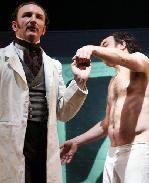SITE GUIDE
SEARCH
REVIEWS
REVIEW ARCHIVES
ADVERTISING AT CURTAINUP
FEATURES
NEWS
Etcetera and
Short Term Listings
LISTINGS
Broadway
Off-Broadway
NYC Restaurants
BOOKS and CDs
OTHER PLACES
Berkshires
London
California
New Jersey
DC
Philadelphia
Elsewhere
QUOTES
TKTS
PLAYWRIGHTS' ALBUMS
LETTERS TO EDITOR
FILM
LINKS
MISCELLANEOUS
Free Updates
Masthead
Writing for Us
A CurtainUp  London Review
London Review
 London Review
London ReviewThe Elephant Man
|
If all that had stared at me had been sacked, there would be a whole town out of work.— John Merrick
|

Antony Byrne as Treves and Joe Duttine as John Merrick
(Photo: Ellie Kurttz) |
Remarkably, Ellen Cairns, the designer, has not given Joe Duttine any special makeup or prosthetic devices to turn him into a man crippled by a disfiguring medical condition. Instead, Frederick Treves describes Mr Merrick's condition while his patient is stripped to the waist and director Ellie Jones suspends the disbelief. Joe Duttine as Merrick holds his head to one side, contorts his mouth and holds one shoulder higher and distorts his back. One arm is held with the fingers extended for the outsized, larger arm and hand and he limps awkwardly with the use of a stick. While we cannot imagine Merrick's real head which was 36 inches in circumference, this is an impressive performance conveying the handicap from which Merrick suffered.
The story opens with a Victorian freak show set in a circular cast iron bandstand. Sheets are stretched to convey a circus tent. Customers pay their admission fee and reappear from the tent shocked and disgusted. It is here that Treves meets Merrick for the first time.
We see the police shutting down this cruel exhibition (progress at last!) but Ross (Clive Hayward), the sleazy "show proprietor" takes Merrick off to the continent where the law is less progressive. There Merrick meets the three Pinhead freaks and Ross decamps and steals Merrick's savings. Somehow Merrick makes his way back to London to the London Hospital and Frederick Treves.
At the London Hospital he is cared for and the hospital guardians take an enlightened view. Merrick becomes something of a celebrity and is visited by the rich, aristocratic and even royalty. He dies aged 28 years when the weight of his head crushes his windpipe and he suffocates. It is only after his death, almost a century later that analysis of his skeleton leads to a more accurate diagnosis of his illness and is able to discount the theory that he had elephantiasis.
Antony Byrne puts in a fine performance as the Royal physician (Treves was physician to Queen Victoria's son the Prince of Wales, later Edward VII). I liked too Catherine Kanter as the actress friend of Treves, Mrs Kendal, who tries to answer Merrick's questions about women. The ensemble cast of just nine put in so much effort that it seems as if we have seen many more. But this is Joe Duttine's evening for recreating Merrick's gentle and disarming manner when fate has dealt him such terrible and painful disability. His performance is truly charming. In the second act, maybe in a dream that Treves is having, Merrick turns the tables on his physicians by describing Treves to an audience as if Treves were a medical specimen of interest. It is a wry and humbling moment in this absorbing study of how we treat otherness.
|
The Elephant Man
Written by Bernard Pomerance Directed by Ellie Jones Starring: Antony Byrne, Joe Duttine With: Sarah Belcher, Jack Bennett, Jamie Bower, Howard Gossington, Clive Hayward, Catherine Kanetr, Paul Moriarty Associate Director: Vik Sivalongam Design: Ellen Cairns Lighting: Oliver Fenwick Composer/Sound: Dominic Haslam A Sheffield Theatres Production Running time: Two hours 15 minutes with one interval Box Office: 020 8985 2424 Booking to 29th March 2008 then at Richmond Theatre 1st to 5th April 2008 Box Office: 0870 060 6651 Reviewed by Lizzie Loveridge based on 25th March 2008 performance at The Hackney Empire Mare Street, London E8 (Tube: Bethnal Green and a bus or train to Hackney) |
|
London Theatre Tickets Lion King Tickets Billy Elliot Tickets Mighty Boosh Tickets Mamma Mia Tickets We Will Rock You Tickets Theatre Tickets |




